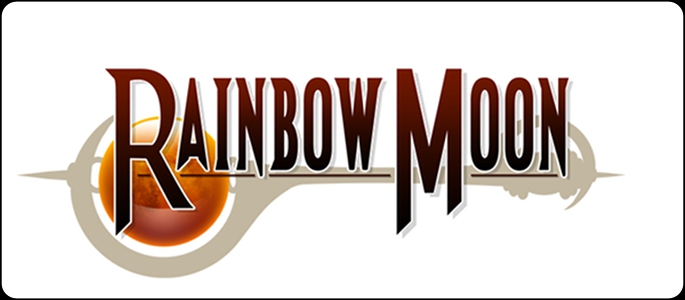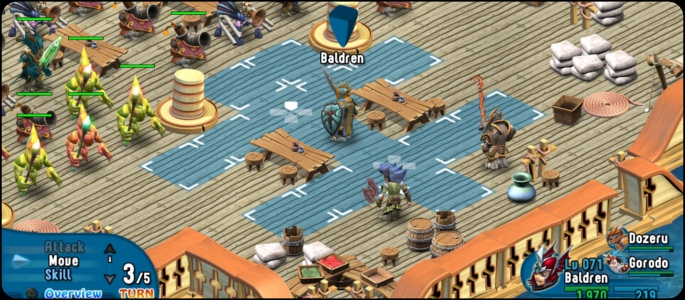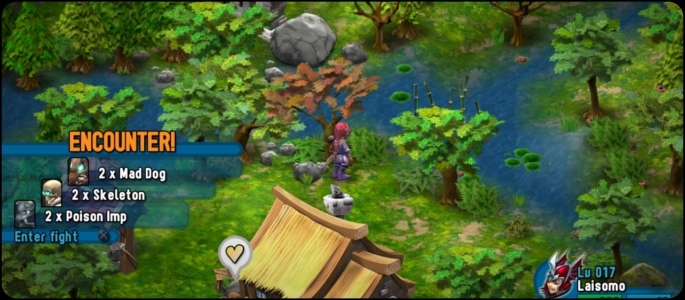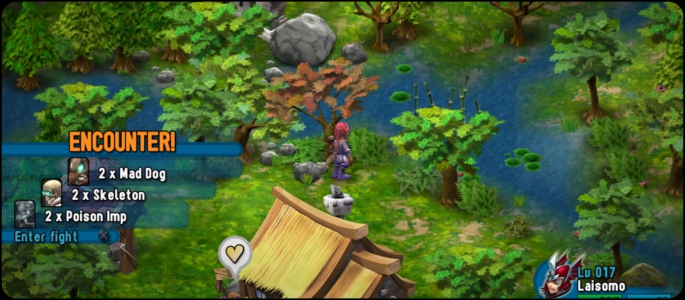
Playing through Rainbow Moon has been a unique experience primarily because it has defied my expectations on every level. The game comes to us from German developer SideQuest Studios and their publishing partner eastasiasoft who brought us the Söldner-X series of side scrolling shoot-em ups. I was also expecting that Rainbow Moon would be a run of the mill, Final Fantasy clone made for a downloadable marketplace. There too I was wrong again as the game features a huge amount of depth, and borrows elements from many other old school console RPGs as well as more modern dungeon crawlers and strategy games. Packed within this game are so many features and ideas that if I were to articulate them all within the context of this review, you, my dearest readers, would be better off reading War and Peace.
War and Peace is actually a fantastic analogy for Rainbow Moon‘s gameplay. It has a plethora of systems, but the magnitude of these aren’t knowable unless you get through the first few hours of the game. Sadly, unlike Tolstoy’s magnum opus, Rainbow Moon features a shallow narrative compared to other RPG games of its ilk. While it’s by no means bad, it never becomes something more than average. The whole story is pretty boilerplate too. You play as Baldren, who is attempting to defeat his nemesis, Namoris. But while hunting him in some woods on Earth, Namoris pushes you into a portal to Rainbow Moon. Now you, Namoris, and a bunch of monsters are trapped on Rainbow Moon looking for a way home…and each other.

Thankfully, the combat more than makes up for the lackluster narrative as it actively engages the player. Unlike other RPGs, the combat in Rainbow Moon requires the player to not only select specific commands, abilities, and spells, but it also makes movement during combat a very important skill to master. Some characters are capable of striking from range while others have to be up close to attack. Battles are also fought with groups of enemies that can number anywhere from 2 or 3 to as large as 30 or more, sometimes with a boss monster added to the mix. Enemies from previous dungeons also find their way into later groups which means you’ll always have to be on your toes to remember which tactics worked best. As a result, the combat is fun, which is good considering how much grinding you’ll be doing in service of advancing the story or exploring higher level areas.
In fact, be prepared to do a lot of grinding, as that is central to progressing the game. Unlike other RPGs where your character’s level is usually high enough after completing one segment of the game before moving onto the next, Rainbow Moon requires the player to fight additional battles and enemies to farm XP and Rainbow Pearls, used for upgrading the base stats on characters. To aid in this endeavor, there are two types of enemy encounters. Usually, monsters are seen wandering around the world map and can just be run into to start a battle. Otherwise, the player will see a prompt pop-up in the lower left of the screen to show that a random encounter has occurred. However, the game doesn’t trigger these encounters unless the player presses X to enter the battle. It’s a nice touch if you want to avoid enemies to get from A to B, or are in need of additional XP, gold, or items.

Throughout this review I’ve made cursory mentions of the systems within the game. I haven’t really talked about them in-depth though because, frankly, they all work really well together, and it seems like a major spoiler to ruin that aspect of the experience for anyone interested. Moreover, the game doesn’t throw you off the deep end, and features some nice tutorials that pop-up whenever the need arises to give you some insight into a new concept. Add to this the convenience of being able to escape from any battle and save anywhere via the well designed menus, and the game becomes accessible for anyone from newbies to seasoned RPG pros.
Lastly there’s the game’s art style. Everything from the environments, to the characters and enemies is just a blast to look at. The graphics look appropriately cartoony, but also vibrant and colorful. The exterior areas appear lush during the day, but dark and foreboding at night. The only complaint I would levy against the game in this regard is that the interior dungeon areas are too repetitive in terms of their makeup. I just wish that the interior environments were more varied considering how much time is spent dungeon crawling. The game’s soundtrack also compliments the unique aesthetic.

Rainbow Moon picked a fantastic time to show up on the PlayStation Store. It’s a well constructed RPG that provides enough hooks to be as addictive as a larger triple-A title like Diablo 3, and scratches the itch for an updated RPG based on an old school format. The game is a huge time sink in terms of exploration and leveling, making it a perfect way to while away the summer doldrums. And while the story is average at best and there’s a lot of grinding, there’s enough here to keep players busy for hundreds of hours. If SideQuest makes a sequel, I hope that they incorporate a deeper, richer narrative. For now though, Rainbow Moon is a fantastic start to what could be a cool franchise, and a huge value to anyone looking for a downloadable RPG. Now if you’ll excuse me, I have a long way to go to get my characters up to level 500.
PlayStation LifeStyle’s Final Score
+ An enormous level of content that will keep players engaged for hundreds of hours. – Narrative is shallow and pretty average. |
 |







